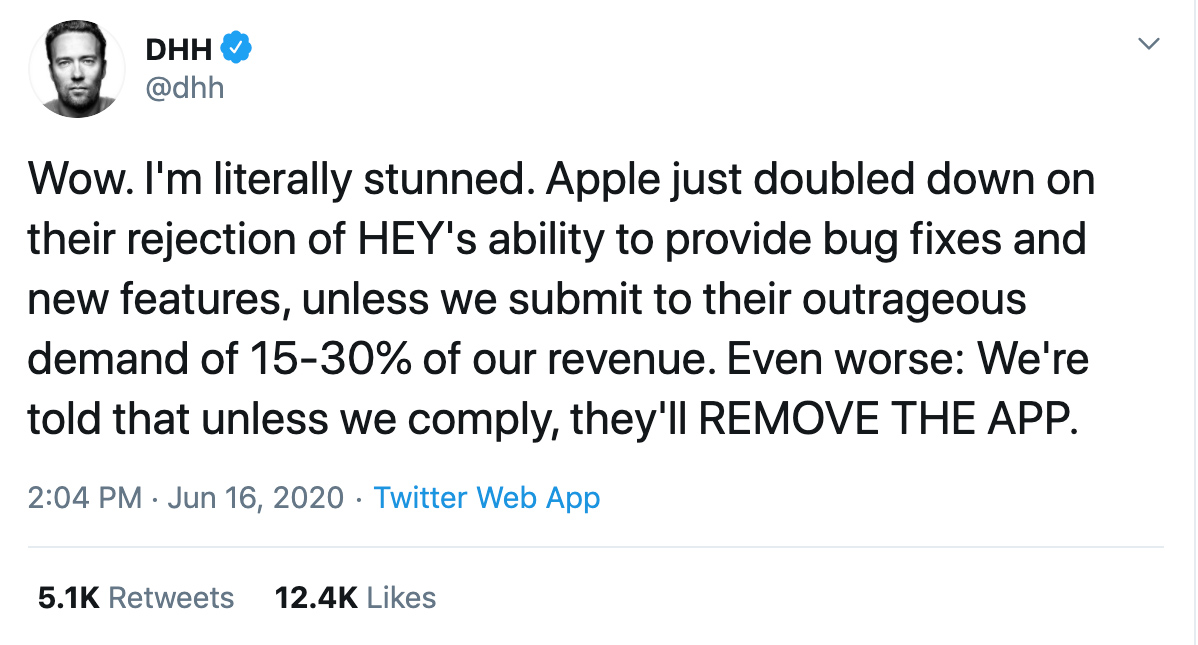Hey vs Apple
posted June 17, 2020 #
Pretty entertaining thread from David Hansson over on Twitter about being held hostage by Apple's App Store.
Hansson is the creator of Ruby on Rails and Basecamp and several other successful products. He recently launched Hey, a new email application that tries to re-invent the whole paradigm. It's an interesting approach that's only slightly cut off at the knees by offering a 14-day trial, $99 price and calling the Inbox the Imbox because it's for Important Emails. Those are small complaints; I think it's admirable they're trying to tackle the email problem.
That's just the background info tho. They submitted the Hey app to the Apple App Store, got approved and then submitted some bug fixes. At that time, an Apple reviewer caught on to the fact that they aren't offering In-App Subscriptions. This may seem like No Big Deal but Apple has a pretty strict guideline in their terms of service that stipulates if you offer Subscriptions somewhere, you must also offer native Subscriptions via Apple... where they get 15%-30% of each transaction.
Lots of folks get upset in the same way Hansson is because they don't want to share their revenue with Apple; despite agreeing to the Terms of Service. If you want access to Apple's massive audience, you gotta pay the piper. Complaining about it - especially in the way @dhh does, comparing Apple to the mob - is a bit absurd.
Except for the fact that Apple is wildly inconsistent with this guideline. Netflix didn't offer In-App Subscriptions for a long time; neither did Amazon Prime and lots of other big names. In fact, Basecamp - one of Hansson's other products - has been in the App Store for years without IAP and it's never been a problem. These exceptions are made because of politics, partnerships and human error.
I don't have any grand statement to make about all this, I just find it interesting to watch. Android doesn't have this issue and they have, arguably, a larger market share (and a similar Guideline). Apple is allowed to make these decisions and exceptions, it's their App Store. They're in plenty of hot water for Antitrust violations but as a company with nearly a trillion dollar market value, I doubt they're intimidated by much.
Hansson is the creator of Ruby on Rails and Basecamp and several other successful products. He recently launched Hey, a new email application that tries to re-invent the whole paradigm. It's an interesting approach that's only slightly cut off at the knees by offering a 14-day trial, $99 price and calling the Inbox the Imbox because it's for Important Emails. Those are small complaints; I think it's admirable they're trying to tackle the email problem.
That's just the background info tho. They submitted the Hey app to the Apple App Store, got approved and then submitted some bug fixes. At that time, an Apple reviewer caught on to the fact that they aren't offering In-App Subscriptions. This may seem like No Big Deal but Apple has a pretty strict guideline in their terms of service that stipulates if you offer Subscriptions somewhere, you must also offer native Subscriptions via Apple... where they get 15%-30% of each transaction.
Lots of folks get upset in the same way Hansson is because they don't want to share their revenue with Apple; despite agreeing to the Terms of Service. If you want access to Apple's massive audience, you gotta pay the piper. Complaining about it - especially in the way @dhh does, comparing Apple to the mob - is a bit absurd.
Except for the fact that Apple is wildly inconsistent with this guideline. Netflix didn't offer In-App Subscriptions for a long time; neither did Amazon Prime and lots of other big names. In fact, Basecamp - one of Hansson's other products - has been in the App Store for years without IAP and it's never been a problem. These exceptions are made because of politics, partnerships and human error.
I don't have any grand statement to make about all this, I just find it interesting to watch. Android doesn't have this issue and they have, arguably, a larger market share (and a similar Guideline). Apple is allowed to make these decisions and exceptions, it's their App Store. They're in plenty of hot water for Antitrust violations but as a company with nearly a trillion dollar market value, I doubt they're intimidated by much.

